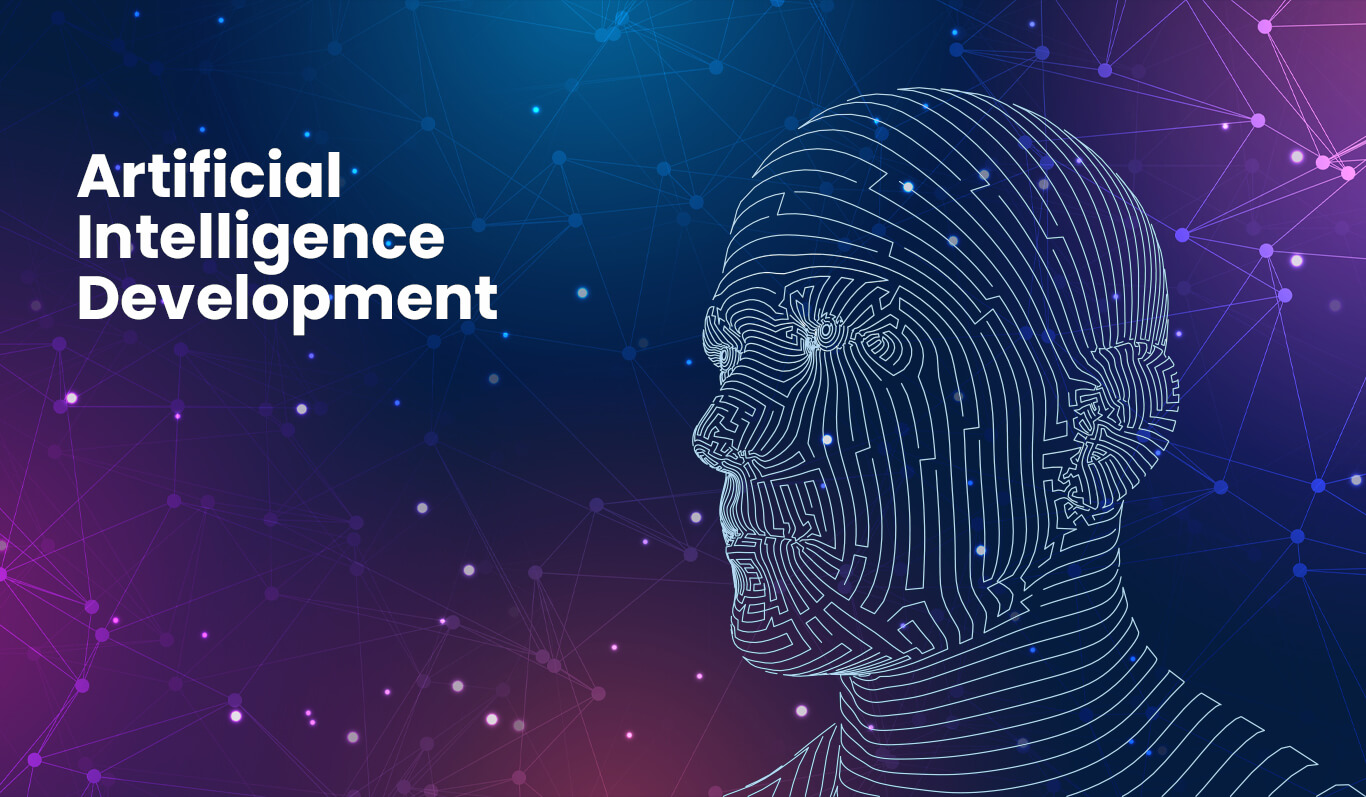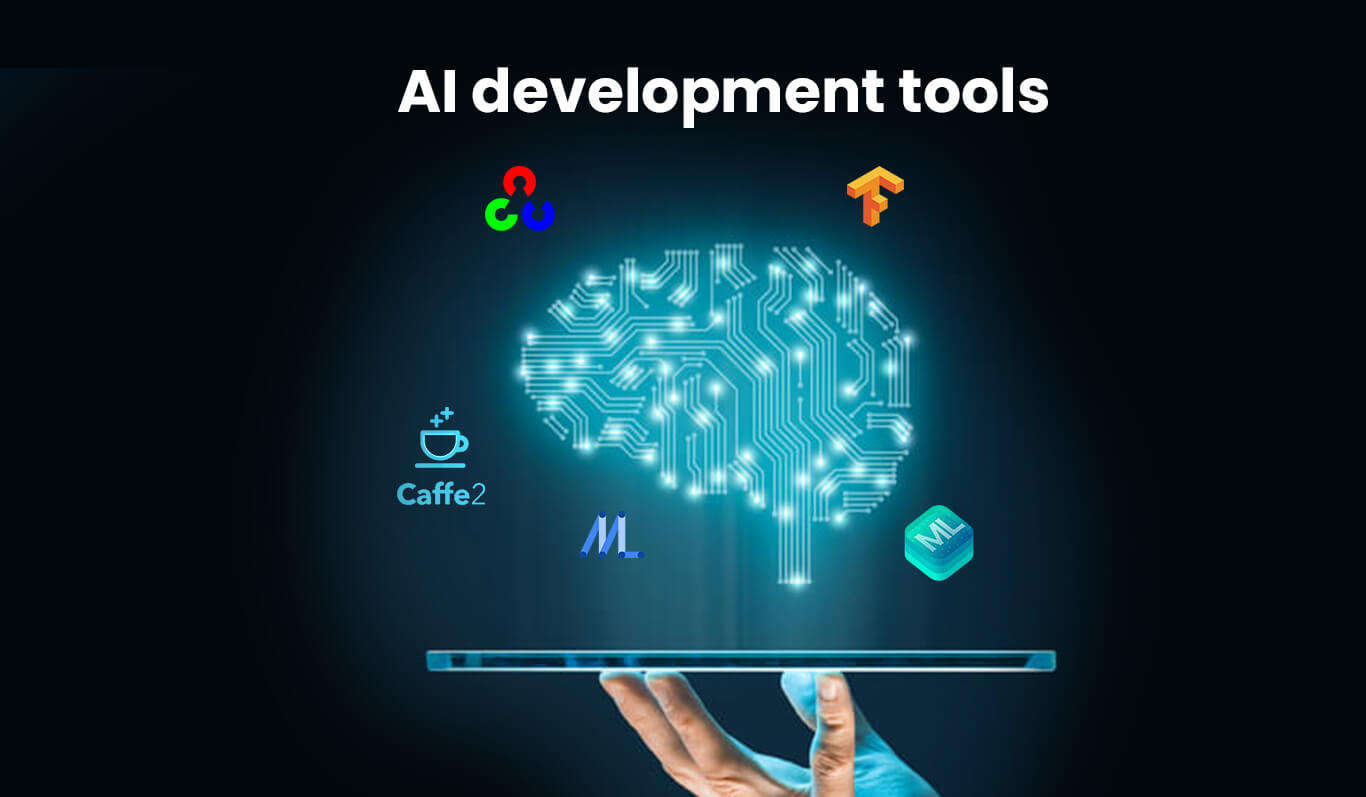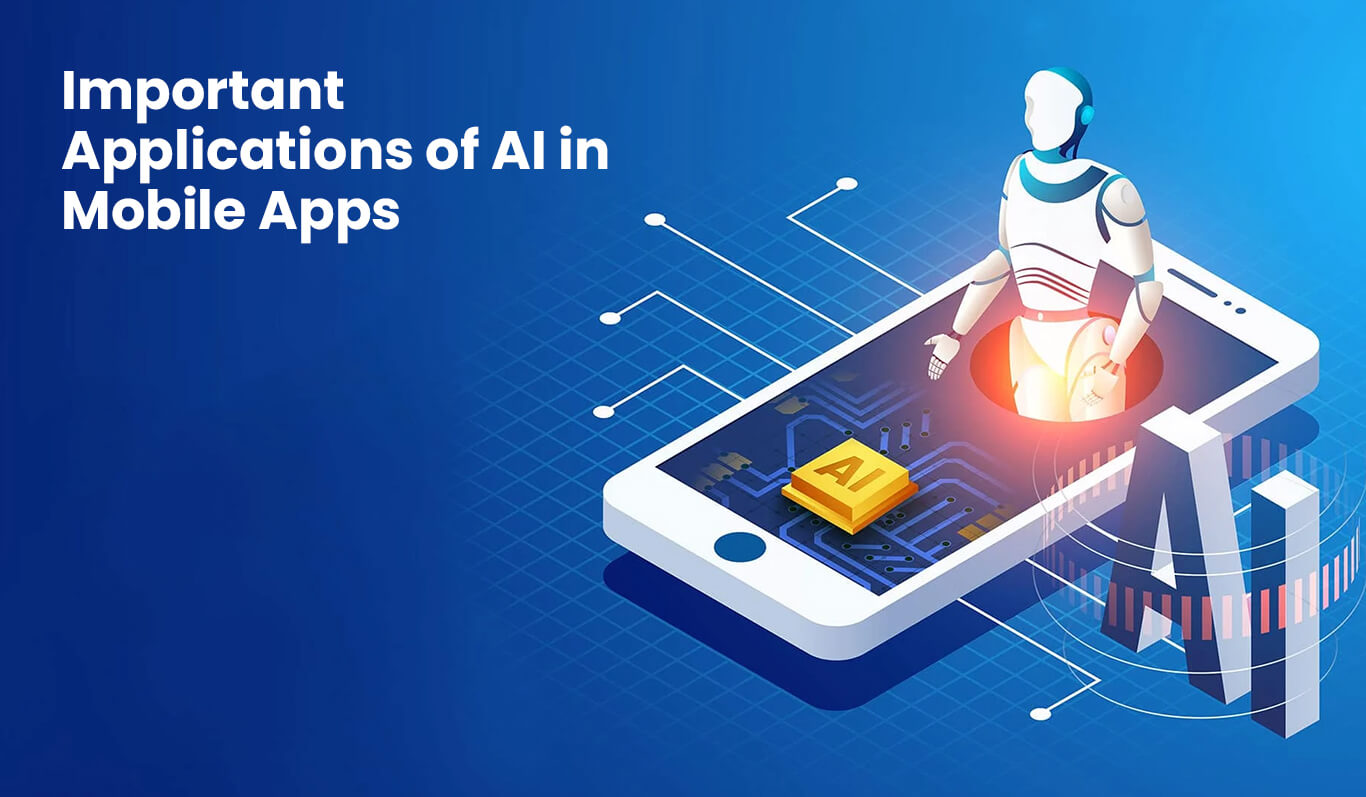Top AI Tools for Mobile App Development

What Is Artificial Intelligence?
The term AI refers to artificial intelligence and is used to describe systems or robots. Artificial intelligence emulates the human intellect in how it carries out tasks and improves itself based on the data gathered. Expert systems, natural language processing, speech recognition, and machine vision are some examples of specific applications of artificial intelligence.
In recent years, AI (Artificial intelligence) has proven to be a valuable technology that helps businesses and startups to compete with competitors, especially in mobile app development.
In today's competitive business environment, artificial intelligence helps many startups grow their business. Nearly 90% of customers believe that businesses must react quickly and that every interaction with them should be very personal. To provide better customer service, more businesses are investing in smarter solutions. AI-powered apps are one of the simplest methods to implement and enhance customer experiences. Some examples are chatbots, voice search, and virtual assistants.
What Is Mobile App Development? Why Are Mobile Apps Important for Startups?
Mobile application development is the process of developing software for smartphones and digital assistants, ideally to be used for Android and iOS. The software can be preinstalled on the device and it can be downloaded from a mobile app store or can be accessed using a phone's web browser.
These are some of the programming and markup languages used in this form of software development.
- Java -Swift
- C#
- HTML5
There are many factors to consider when developing mobile apps for startups. Understanding the end user, their needs, and how they interact with digital devices is essential in designing an application that successfully meets these expectations.
Every company wants to grow its customer base, brand recognition, sales, and income. All of these things are possible with a mobile application that enables organizations to discover numerous growth opportunities and generate significant revenue.
The first step is to respond to the customer’s demands and provide them with up-to-date information and this can only be done with the help of an experienced mobile app development company like Neetable.
Top AI Tools Used by Mobile App Service Providers

Following are the top AI development tools that increase the efficacy of mobile apps.
- Core ML: A top Artificial Intelligence tool from Apple
Apple's machine learning framework, Core ML, was introduced in June 2017. The project was created to improve user privacy, focusing on in-built ML devices rather than cloud-based solutions. Core ML is an effective machine learning framework, with a simple drag-and-drop user interface and top-notch features:
Natural Language Framework enables you to study text by splitting natural language content into paragraphs, phrases, or words.
Sound Analysis Framework is used to analyze audio and it is also used to distinguish between sounds like highway noise and bird songs.
The use of speech framework enables the identification of speech in a variety of languages in both live and recorded audio.
Functionalities
- Recognition of faces and facial landmarks
- Comprehending barcodes
- Recognition of scripts and languages registration of images -Use a reusable and useful framework to create games.
- Recognition of text
- Caffe2:
Facebook has created a scalable, adaptive, and lightweight deep learning framework, the Caffe project originated at the University of California, Berkeley. It is designed primarily for mobile development and production use cases. Caffe2 gives programmers more creative freedom in creating high-performance apps.
The purpose of Caffe2 is to simplify deep learning experiments and to make use of community contributions to new models and methods. It is cross-platform and works with Visual Studio, Android Studio, and XCode for mobile programming.
Its Python and C++ APIs make development, training, and model deployment simple, while its core C++ libraries offer performance and portability.
Functionalities
- Ensure automation is feasible.
- Image tampering
- Detect objects, if necessary.
- Statistical and mathematical operations
- Support for distributed training enables quick scaling up or down.
- "TensorFlow:"
The open-source machine learning platform, TensorFlow is built on deep-learning neural networks. It uses a common symbol to integrate deep learning and machine learning techniques.
TensorFlow is built on Python, and C++ is used to run mobile apps. More individuals can create innovative mobile applications based on AI-powered accessible designs. Some of the most well-known companies adopting Tensorflow-based AI technology are Airbnb, Coca-Cola, and Intel. It is an open-source AI library that builds models using data flow graphs.
Understanding, prediction, categorization, discovery, creativity, and perception can all be accomplished with TensorFlow. The design of this framework enables computing on any GPU or CPU. It works with a PC, server, or even a mobile device. For more advanced machine learning models Google uses TensorFlow for Rank Brain and Google Translate.
Functionalities
- Understanding speech
- Recognition of pictures
- The positioning of elements
- Understanding of gestures
- Character recognition using optical
- Translation and text classification
- Artificial voice
- OpenCV:
Both Android and iOS applications include OpenCV. It is a free, cross-platform, and open-source toolkit that is used to create real-time computer vision applications. It has C++, Python, and Java interfaces and supports Windows, Linux, Mac OS, iOS, and Android. Additionally, it supports the deep learning frameworks Poarch and TensorFlow. OpenCV's primary goal is to create a uniform infrastructure for computer vision applications. OpenCV advances the adoption of machine learning.
Functionalities:
- Face recognition and detection
- Recognize items and classify human activity in videos
- Obtain the object's 3D model.
- Utilize stereo cameras to produce 3D point clouds.
- Create a high-resolution photograph of a scene by combining many images.
5. ML Kit: Google's Top-Notch Artificial Intelligence Tool
A mobile SDK is called an ML Kit. It enables programmers to create intelligent iOS and Android applications.
Google's strong and user-friendly vision and Natural Language APIs solve a variety of common app issues and obstacles to create seamless user experiences. All of these tools are available for free and are driven by Google's top-notch machine-learning models.
-
Vision: Objects and faces can be identified, barcodes can be detected, and pictures can be labeled with this image and video analysis API.
-
Natural languages: These APIs can recognize and translate text in 58 different languages while also suggesting possible responses.
-
Custom development: TensorFlow Lite-powered AutoML Vision Edge is used to construct models, do tests, and publish them using ML Kit.
Important Applications of AI in Mobile Apps

Chatbot automation - What is the point of having a chatbot? Chat automation can spare your app-building company from spending tens of thousands of dollars. Chatbots aid companies in saving time and money spent answering customer queries or requesting help from agents. In addition to this, chatbots help to grow contacts by expanding marketing channels.
- Security -
App users frequently worry about security, particularly those who use services like mobile banking or online shopping that handle sensitive data and also process digital payments. AI analyzes huge amounts of information quickly and identifies possible cybersecurity dangers, and artificial intelligence foresees attacks and alerts app users.
- Analytics -
Analytics is a critical tool for all app-making agencies. It can help you improve your business. You'll be able to examine data from every part of your business, from marketing to operations and customer support. This will enable you to make informed decisions to achieve a more favorable bottom line.
In healthcare, retail, insurance, or finance, it is crucial to evaluate performance, learn about consumer behavior, and enhance service. You'll be able to evaluate previous performance and make predictions about what is likely to occur in the future with the help of analytics.
Which Industry Benefits Most From AI?
Nearly all businesses are taking advantage of AI's benefits with the help of partners who have created artificial intelligence applications since Industrial Revolution (IR) 4.0 began.
-
Healthcare - Artificial intelligence in healthcare is a generic phrase that refers to the application of cognitive technology and machine learning algorithms to enhance health outcomes. Governments, investors, inventors, and healthcare decision-makers are all increasingly interested in the development of artificial intelligence.
A rising number of countries intend to apply AI to healthcare, and several areas are making significant investments in AI research. Healthcare startups, pharmaceutical firms, manufacturers of medical equipment, and health insurers are all incorporating AI.
-
Education- Parents and instructors can meet at any time that works for both of them, with the help of AI-powered appointment scheduling tools like Acuity Scheduling, Doodle, etc. The AI-powered tool is used in today's schools, not only to assist students with reading, language development, and social interactions but also to contribute to the formation of critical social skills for kids with impairments.
-
Marketing - Organizations enhance their entire marketing operations with the help of artificial intelligence. AI marketing automates operations like planning, delivering emails, and forecasting the success of campaigns.
Marketing strategies have advanced past door-to-door sales techniques. With more and more activities taking place online, customers want businesses to predict their requirements and provide them with timely service. AI is a requirement since speed, efficiency, and customization play a significant role in the customer journey.
Whether it's forecasting campaign performance or studying client sentiment, businesses all across the world are utilizing AI to enhance their marketing initiatives.
Frequently Asked Questions
1. What is the most advanced AI now?
Companies can spend between $25,000 and $300,000 on AI software. Depending on the solution, it could be a third-party solution or an internally developed platform.
- $6000 to $300,000 for custom AI solutions
- $10000 to $40,000 per year for third-party AI software
- If the business uses third-party AI software, such as a chatbot that has already been developed, companies can spend up to $40,000 a year
- Custom AI solutions, in contrast, can cost anywhere from $6,000 to over $300,000. Permanent AI services, like those required for consulting, typically cost less and are based on the hourly rate of the consultant. The typical hourly rate for AI consultants is $200 to $350.
2. What are the 4 types of AI systems?
One of the most interesting areas of technology is artificial intelligence research. There are several ongoing discoveries and advancements, most of which belong to the following four categories:
- reactive machines
- limited memory
- Theory of mind
- Self-aware
3. Which language is used for AI?
One of the most popular programming languages used in AI is Python. Java, C++, and JavaScript are other strong rivals, but Python is one of the best all-around choices for AI development.
-
Easy to understand - It's very easy to learn Python. This artificial intelligence programming language has numerous features. It improves the quality of life and the simplicity of use, and Python's syntax is incredibly versatile. Python is intuitive enough for non-programmers as well.
-
The Python programming language is simple to read and write. Python generates short, highly readable code, especially when compared to other languages like Java.
-
Excellent Tools for Visualization-Python offers a wide range of data visualization modules, which are crucial for the creation of AI.
Request a Quote
Categories
Popular posts
Best Practices for Software Product Engineering Every CTO Should Implement
2023-14-18How to Build Your Own On-Demand Carpooling App Services?
2023-08-25How to Start an On-Demand Fuel Delivery Business: A Comprehensive Guide
2023-07-28Empowering Miners: How Fleet Management Apps are Transforming the Mining Industry?
2023-07-21A Complete Guide to Develop a Food Delivery App for Restaurants in 2023
2023-07-08Mobile Apps Transforming the Travel Industry: A Game-Changer in Travel Planning and Experience
2023-07-07
